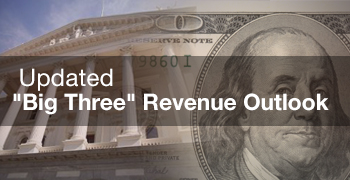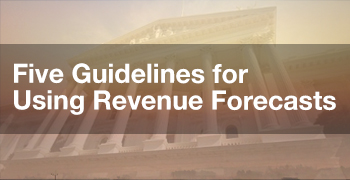
The 2025-26 Budget: Partial Income Tax Exclusion for Military Retirement Income February 13, 2025
The Governor proposes to exclude from state income taxation up to $20,000 in annual military retirement benefits. The exclusion would be available to individuals with income below $125,000 ($250,000 for joint taxpayers.) Our assessment is that the economic and fiscal rationale for this proposal is weak. Nonetheless, we recognize that other factors often are relevant to the Legislature’s decisions. In assessing the administration’s proposal, the Legislature will need to decide if these other factors are enough to support this tax change. If the Legislature simply wants to provide limited tax relief to veterans, that might also improve veterans’ perceptions of the state, it could adopt the administration’s proposal. If the Legislature instead prefers that this tax expenditure have a clear economic or fiscal rationale, it could reject the administration’s proposal.
January 2025 Los Angeles Wildfires Impact on Local Property Tax Revenues February 10, 2025
The devastating Los Angeles County fires of January 2025 destroyed thousands of structures, causing significant damage and displacement. This post assesses the implications for property tax revenues. The county faces a $10 billion to $20 billion reduction in assessed property values, estimated to result in a $100 million to $200 million annual property tax revenue loss to affected local governments. The governor's executive order delays tax payments for 218,000 properties until April 2026. By themselves, we expect these delays will have minimal long-term fiscal impacts.
Data Revisions Shows Monthly Survey Again Overstating Job Growth December 16, 2024
Since mid-2022, the state's monthly jobs survey has tended to overestimate actual employment growth. The data revision from the first quarter of 2024 gave some hope that this pattern was correcting, but the newest incoming data show the monthly survey again overstating employment. Specifically, the most recent match to administrative records shows the survey overestimated job creation from March through June this year by roughly 150,000 jobs (preliminary survey gain of 68,000 relative to matched net loss of 78,000 jobs).
Cannabis Tax Revenue Update (2024 Q3) December 3, 2024
Our new forecast for 2024-25 cannabis tax revenue is $653 million, somewhat lower than the May Revision forecast of $695 million.
Update: Tech Company Equity Pay Driving Withholding in 2024 November 20, 2024
California's technology companies, including giants like Apple, Google, Nvidia, and Meta, are some of the most valuable companies in the world and support thousands of high-paying jobs in the state. Many employees at these companies receive equity pay, such as stock options and restricted stock units, in addition to their base salary. As we first pointed out a year ago, state income tax withholding on equity pay has grown notably in recent years due to the AI boom in asset prices for these companies. With updated data from early 2024, we now believe withholding from these sources reached about 10 percent of all income tax withholding during the first half of 2024.
U.S. Retail Sales Update: October 2024 November 15, 2024
U.S. retail sales have grown 1.1 percent over the last 3 months and 2.8 percent over the last 12 months. Retail sales growth has outpaced inflation substantially over the last 3 months, but only slightly over the last 12 months.
U.S. Retail Sales Update: September 2024 October 17, 2024
U.S. retail sales have grown 1.7 percent over the last 3 months and also 1.7 percent over the last 12 months. Retail sales growth has outpaced inflation over the last 3 months, but not over the last 12 months.
U.S. Retail Sales Update: August 2024 September 17, 2024
U.S. retail sales have grown 0.9 percent over the last 3 months and 2.1 percent over the last 12 months. Retail sales growth has outpaced inflation over the last 3 months, but not over the last 12 months.
Cannabis Tax Revenue Update (2024 Q2) September 4, 2024
Our new cannabis tax revenue estimates are similar to the revenues anticipated by the 2024-25 budget package.
U.S. Retail Sales Update: July 2024 August 16, 2024
U.S. retail sales have grown 1 percent over the last 3 months and 2.7 percent over the last 12 months. Retail sales growth has outpaced inflation over the last 3 months, but not over the last 12 months.
IRS Data Show Pandemic Uptick in Outmigration Continues July 31, 2024
Recently released figures from the Internal Revenue Service (IRS) show that California continues to lose taxpayers to other states. The state has long had annual net outmigration (more people moving out of California to other states than moving in) but the trend has increased since 2020. Looking ahead, should the heightened trend of net outmigration continue, it could drag down annual income tax revenue growth below its long-term average.
U.S. Retail Sales Update: June 2024 July 16, 2024
U.S. retail sales have grown 0.1 percent over the last 3 months and 2.3 percent over the last 12 months. Over both periods, sales have grown more slowly than inflation.
California's Private-Sector Labor Market Showing Broad Weakness July 1, 2024
The state's modest job growth over the past two years is a tale of two labor markets. Hiring in public and publicly supported sectors has bouyed job losses in many of the state's high-paying private sectors. While job losses have hit California, nationally these private-sector industries are faring much better.
U.S. Retail Sales Update: May 2024 June 18, 2024
U.S. retail sales have grown 0.4 percent over the last 3 months and 2.3 percent over the last 12 months. Over both periods, sales have grown more slowly than inflation.
Newest Early Jobs Revision Shows No Net Job Growth During 2023 June 17, 2024
A newly released "early benchmark" of the official state jobs figures shows that payroll jobs declined by 32,000 from September 2023 through December 2023, whereas the official state tally showed growth of 117,000 jobs over that period. With the fourth quarter early revision, calendar year 2023 shows essentially no net job gains.

















